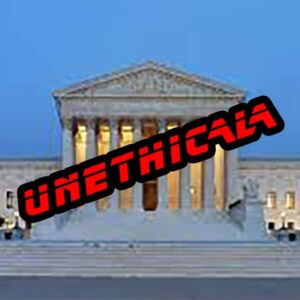
FEDERAL GOVERNMENT ETHICS HISTORY
The Ethics in Government Act was passed on October 26, 1978 and set out to develop a code of conduct for federal employees. By the mid-1990s, ethical standards for all executive branch employees were drawn up and implemented.
At that time, I worked as a first line supervisor for the Equal Employment Opportunity Commission. (Full disclosure here. Clarence Thomas was my boss when I began with the agency although I never met him or interacted with him.) The scrutiny was rigorous:
- Mandatory yearly ethics training.
- Yearly reporting of the financial holdings of myself and my children.
- Work activities were monitored.
I did get in trouble once. My ex-husband controlled the college savings accounts for our minor children and had invested it in Exxon stock—I reported it as required. One day I signed off on a complaint against Exxon marking it as “not” discrimination. (Note: I probably signed off on 60 to 80 cases a month. The ethics officer called, asking why I had not recused myself. I explained that I simply forgot. I had no control over the investments so just didn’t think of them. Besides, I asked, what action could I take that would sway Exxon stock. From then on, I was more careful.
The judiciary branch does have a Code of Ethics for judges.
JUDICIARY ETHICS TODAY
Canon 1: A Judge Should Uphold the Integrity and Independence of the Judiciary
Canon 2: A Judge Should Avoid Impropriety and the Appearance of Impropriety in All Activities
Canon 3: A Judge Should Perform the Duties of the Office Fairly, Impartially and Diligently
Canon 4: A Judge May Engage in Extrajudicial Activities That are Consistent With the Obligations of Judicial Office
Canon 5: A Judge Should Refrain From Political Activity
But guess what? According to the National Constitution Center—Supreme Court Justices aren’t required to observe the code. According to the Constitution, they serve as long as they exhibit “good behavior,” or face possible impeachment and removal for “treason, bribery, or other high crimes and misdemeanors.”
SUPREME COURT ETHICS TRANSGRESSIONS
Justice Thomas has been called on the carpet before, as far back as 2011, so he should be well aware of the reporting he should be doing. I strongly suggest you read about what has been uncovered for yourself so you can make up your own mind.
He has:
- Taken free luxury trips from a wealthy Republican donor and did not disclose them.
- Failed to report and/or misrepresent spousal income.
- Failed to disclose a real estate deal with the wealthy Republican donor.
- Under-reported
He is not the only Supreme Court member to take advantage of his position. Justices Antonin Scalia, Ruth Bader Ginsberg, Stephen Breyer, and others have taken questionable trips. Justice Abe Fortas (Democratic appointment) resigned in 1969 amid a swirl of financial controversy.
ETHICS FIXES
This is not a red problem or a blue problem—this is an American problem. Regardless of party affiliation, all members of the Supreme Court should have the same ethics expectations as any federal employee.
When court members behave in a manner that appears improper, our judicial system is weakened and that’s bad for our democracy.
Please contact your representatives and demand that the Supreme Court, as well as the President and Vice-President, are required to behave as the rank and file.
Sign up on www.mariewatts.com to receive future Stories About Life delivered to your email address or read more stories by clicking here.

Recent Comments